 Petzlover
Petzlover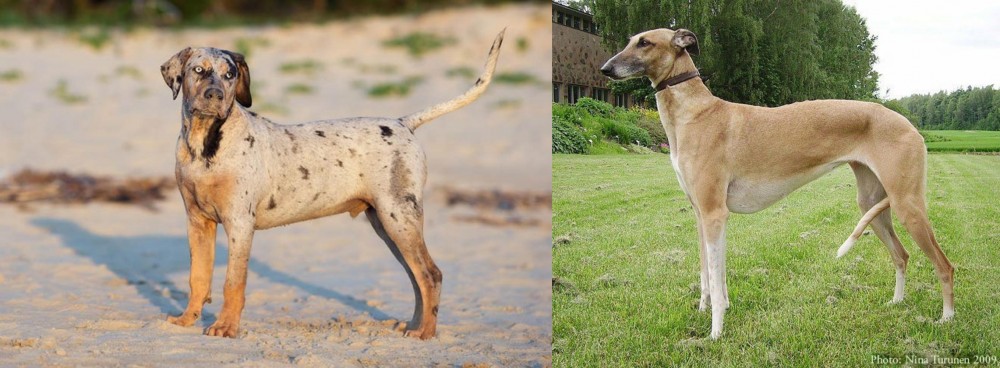 Catahoula Cur is originated from United States but Hortaya Borzaya is originated from Russia. Both Catahoula Cur and Hortaya Borzaya are having almost same height. Catahoula Cur may weigh 13 kg / 29 pounds more than Hortaya Borzaya. Both Catahoula Cur and Hortaya Borzaya has almost same life span. Catahoula Cur may have more litter size than Hortaya Borzaya. Both Catahoula Cur and Hortaya Borzaya requires Low Maintenance.
Catahoula Cur is originated from United States but Hortaya Borzaya is originated from Russia. Both Catahoula Cur and Hortaya Borzaya are having almost same height. Catahoula Cur may weigh 13 kg / 29 pounds more than Hortaya Borzaya. Both Catahoula Cur and Hortaya Borzaya has almost same life span. Catahoula Cur may have more litter size than Hortaya Borzaya. Both Catahoula Cur and Hortaya Borzaya requires Low Maintenance.
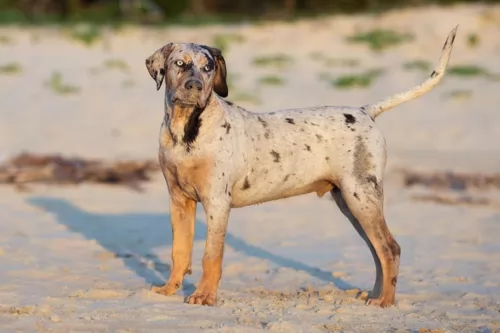 The Catahoula Cur is also known as the Catahoula Leopard Dog or the Louisiana Catahoula. The dog hails from Louisiana, United States.
The Catahoula Cur is also known as the Catahoula Leopard Dog or the Louisiana Catahoula. The dog hails from Louisiana, United States.
It is thought that the Catahoula Cur or Catahoula Hound as it is also known, used to be a hunting dog. The first settlers in Louisiana needed a strong dog to help them with hunting wild hogs and they bred their dogs with other dogs belonging to the locals. This gave them a strong, resilient dog that could take on the wild hogs and also protect their livestock.
Dogs who have no doubt been brought into the mix to produce the Catahoula Cur are mastiffs, Beaucerons, sighthounds and wolves.They are today more commonly referred to as Catahoula Leopard Dogs.
 The Hortaya Borzaya is an ancient sighthound from Asia with its origins in Kievan Rus = Grand Duchy of Lithuania = Polish-Lithuanian Commonwealth and the Empire of Russia. The Hortaya is a large dog, especially a long in body dog with a muscular build suitable for running fast. He is one of the most talented of sighthounds, able to track moving prey at quite great distances. He is an intensely active when running prey and quiet and well balanced when not working.
The Hortaya Borzaya is an ancient sighthound from Asia with its origins in Kievan Rus = Grand Duchy of Lithuania = Polish-Lithuanian Commonwealth and the Empire of Russia. The Hortaya is a large dog, especially a long in body dog with a muscular build suitable for running fast. He is one of the most talented of sighthounds, able to track moving prey at quite great distances. He is an intensely active when running prey and quiet and well balanced when not working.
In Asia and Russia, it is still a working hunting dog, hunting a variety of game such as Saiga antelopes, wolves, foxes, and hares. With tremendous endurance, the Hortaya can run at great speeds and great distances on the hunt. The Hortaya Borzaya is a long distance runner rather than a sprinter like the greyhound we are all so familiar with. He also needs very little rest between runs of up to 4 km. The Hortaya uses his sense of smell as well as sight in the hunt. They hunt solo, in pairs or in packs.
It was not until 2004 that the Hortaya was first exported to Europe and given full breeding papers. They went to Germany, Slovakia and the Czech Republic in 2004. They went to Switzerland and Finland in 2005 and to the United States around 2005. Prior to this the Hortaya Borzaya was bred only in its original territory for thousands of years.
Unlike Western breeding programs, the Hortaya is not bred for the purpose of improving the breed. Like Asian thoroughbred horses the breed is considered “finished”. Because of this there was no inbreeding, linebreeding or incest. This is true for about 4-6 generations of a line. This helps the breed to stay healthy.
The breed was developed centuries ago being bred by many different groups of people throughout the region, making it impossible to say exactly where and how this Central Asian/Afghanistan/ southern Russian breed developed. The Russian Kynological Federation (RKF) member of the FCI, developed a standard for the Hortaya Borzaya, which unlike most breed standards, does not tell you what the Hortaya must be like. Instead it tells you what he cannot be.
It gives boundaries that the dog must fit inside in order to be considered a Hortaya Borzaya. This is because the breeds of these dogs in their native territories want to preserve as many different types and sub-types as possible under the banner of one breed. To most people these dogs would look like very different breeds. For this reason, they have not been accepted into International Breed Groups and Associations. The breeders of these dogs do not want to be tied down to one standard. They do not want the breed to be separated into western lines and the original line or show lines and working lines. They wish to keep all the dogs within one grouping.
The breed is recognized on the national level by the originating countries and federations, including Russia’s. There are an estimated 2500-3500 dog of this breed in existence to day. Only a few dozen of the breed exist outside of the original countries. In other Eastern and European countries, the dogs may be registered with hunting associations instead of a breed association.
The breed is held mostly by hunters in remote, local areas and villages that are fairly isolated. Here the Hortaya is seen as a partner in feeding the hunters family and the dog is invaluable. In these remote areas a good hunting dog is equal in value to the good horse. Both are essential to the hunter and his family’s livelihood.
The Hortaya Borzaya is a pack dog and does well with the family as well as an athletic hunter. They hunt in packs, small groups or alone and bring their catch back to the hunter for the family meal. No hunter had to go with the dog. In fact, the hunters would send the dogs several times for food. The Hortaya might travel for miles across tough terrain to get food for the family.
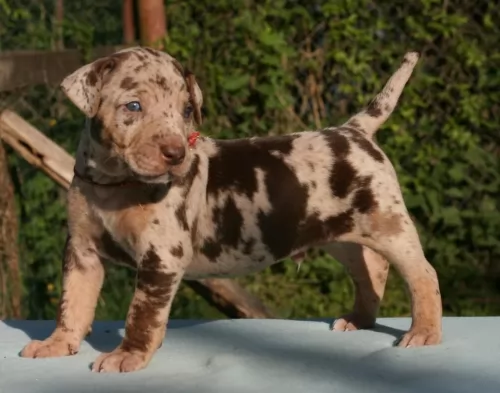 There are varying sizes for Catahoulas and a typical height is 51–66cm and weighing anything from 18 – 51kg. These Cathoula Cur’s come in different colors too, but the leopard-like coat is a dominant feature with this dog.
There are varying sizes for Catahoulas and a typical height is 51–66cm and weighing anything from 18 – 51kg. These Cathoula Cur’s come in different colors too, but the leopard-like coat is a dominant feature with this dog.
While there are solid colors, you can expect red- and blue merle, grey-, black, patchwork and brindle too.
The length of the coat varies somewhat too and while the coat is essentially short and smooth, there are Catahoulas where the coat is a little longer and more coarse.
The eyes of the Catahoula Cur are another interesting feature and both eyes can be the same color, but in some instances the one eye can be brown while the other could be blue, green or gray. The ears of the Catahoula Cur are medium in size and are floppy, dropping down close to the head.
The Catahoula Cur is an intelligent dog and also active and full of sports. You can’t call this dog aggressive, but merely assertive, being strong-willed. He is also affectionate and loyal, loving to spend time with his human family.
He makes a wonderful family pet, complete with children as well as other pets in the home, more so when he has been trained and socialized. These dogs are bright and alert and they also make excellent watch dogs. People who have owned a Catahoula Cur will tell you that these are wonderful pets, full of life and personality.
 This athletic sighthound is a handsome dog, ranging from large to giant. Remember there are many different ‘types’ of dogs within the one line/breed of Hortaya. Breed standards are exclusionary, and performance based rather than inclusionary, and appearance based. Still most of the breed lines share many of the same traits.
This athletic sighthound is a handsome dog, ranging from large to giant. Remember there are many different ‘types’ of dogs within the one line/breed of Hortaya. Breed standards are exclusionary, and performance based rather than inclusionary, and appearance based. Still most of the breed lines share many of the same traits.
They are a long legged breed with a very deep chest and flexible spine. They have immensely strong lungs and a narrow but long skull. Their gait is fluid, effortless trotting when not hunting. When she is hunting, they gallop like a horse and cover a lot of ground.
There eyes are usually black but can be any color and their fur is also any color. It is thick and dense. Finally, in the 2000’s, there were some dogs in a subline exported to Europe and to North America. Here, for this subgroup, a standard was established based on appearance and the color or the coat was now set at only white, blue, black, cream, red, sable and brindle, and piebald. They might or might not have a saddle. Definition of this type is still going on and has not been entirely settled yet. This standard is only for the European and American market show dogs.
These dogs, bred for show, have the same ability to run like the wind and for a very long time with his muscled body and long legs. The breed has strength and stamina that will fool you. He also has a long neck and broad back. He has thin, short ears.
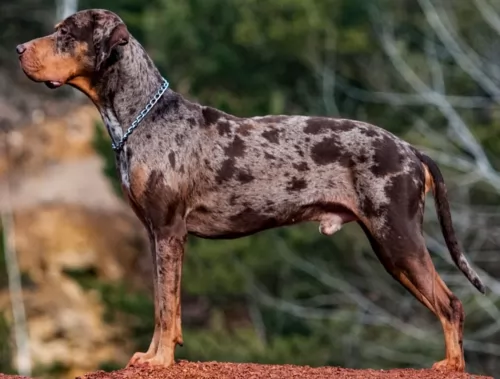 Catahoula dogs are the kind of dogs that make perfect family pets as they are all rounders. They’ve got characteristics that everybody wants in a dog. They are naturally protective, even they are not described as aggressive dogs. With training and socialization they get on well with children as well as other pets in the home. He is alert and territorial, which makes him a good watchdog, more so because he doesn’t particularly like strangers.
Catahoula dogs are the kind of dogs that make perfect family pets as they are all rounders. They’ve got characteristics that everybody wants in a dog. They are naturally protective, even they are not described as aggressive dogs. With training and socialization they get on well with children as well as other pets in the home. He is alert and territorial, which makes him a good watchdog, more so because he doesn’t particularly like strangers.
Intelligent and independent, training makes him wonderfully obedient and relaxed. However, give him the chance for ball games and a walk, and he is more than ready.
He is used to being a guard- and hunting dog, and this makes him an active, energetic dog. You will need to give him plenty of activities if you don’t want this amicable dog becoming anxious, frustrated and destructive.
Exercise him well, provide him with nourishing, top quality food together with fresh water and shower him with the love and attention he deserves as a family member. You’ll also join the ranks of Catahoula Cur owners who want to tell others about what an awesome pet he makes.
 Children friendliness - yes, they are very good with children and will play with them for hours.
Children friendliness - yes, they are very good with children and will play with them for hours.
They have tremendous stamina, speed and intelligence to hunt on their own without the hunter and bring the prey back in good shape for the hunter’s family to eat.
No they are not very adaptable in terms of living arrangements. They will not do well in an apartment and probably not in the city as they need land to run.
Learning ability yes, they are intelligent and learn easily.
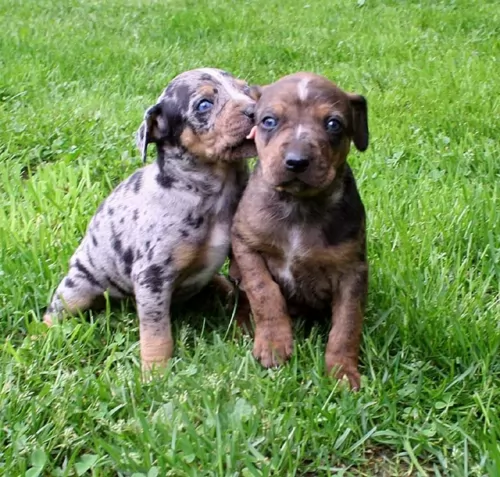 When you buy a Catahoula Cur, you can know that your pet is going to be fairly healthy, however there will be some common health issues to look out for, and by knowing about these health concerns, you can be better prepared.
When you buy a Catahoula Cur, you can know that your pet is going to be fairly healthy, however there will be some common health issues to look out for, and by knowing about these health concerns, you can be better prepared.
Your Catahoula Cur will be susceptible to some bacterial and viral infections which can be life threatening for him if he gets them. Some of these are parvo, distemper and rabies. That is why it is important to have your pet vaccinated, which can start at about 8 weeks of age for a puppy.
Obesity is a world-wide problem with humans and with their pets and it can open up a whole lot of problems with your pet’s health that he otherwise might not have got. It can play havoc with your pet’s digestion, and it can cause joint problems too.
It can be so tempting to pop a sweet treat into your pet’s mouth because you love him so much, but get to know what foods can actually be hazardous for him.
 As previously mentioned, the original breed is isolated and therefore has a pretty good health track record. Most of the breed specific illnesses or conditions that usually are inherited barely exist in this breed.
As previously mentioned, the original breed is isolated and therefore has a pretty good health track record. Most of the breed specific illnesses or conditions that usually are inherited barely exist in this breed.
They have a propensity toward obesity and diet is essential to prevent other issues.
Chronic or acute pancreatitis is possible because the breed developed eating small meals and hardly any meat. Too much meat or fat could cause this.
No tolerance for high protein dog food. Can cause puppies to have life threatening damage to bones and cartilage that is irreversible.
Bloat – because of the deep chest and the intolerance for large meals they are prone to bloat.
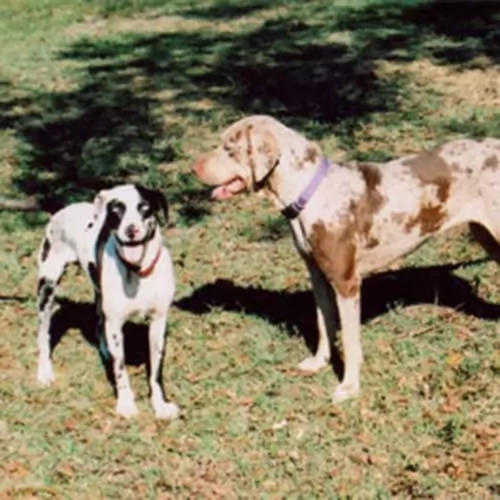 Your Catahoula Cur isn’t a high maintenance dog and a good brushing 2 times a week will keep his leopard coat looking shiny and free of loose hairs.
Your Catahoula Cur isn’t a high maintenance dog and a good brushing 2 times a week will keep his leopard coat looking shiny and free of loose hairs.
Catahoula’s have good teeth, and you want to keep them that way by brushing them at least 2 or 3 times a week to prevent dental decay and a host of other medical issues.
 As mentioned above do not overfeed a Hortaya Borzaya puppy. There is serious risk of irreversible damage if you do. Feed small meals 3-6 times a day with lower protein.
As mentioned above do not overfeed a Hortaya Borzaya puppy. There is serious risk of irreversible damage if you do. Feed small meals 3-6 times a day with lower protein.
3 cups of an average protein high quality dog food served at least 3-4 times per day. To avoid bloat do not feed large meals before or after exercise and don’t let your dog drink a lot of water at one time.
This is an extremely active dog bred to hunt 5-6 times a day over wide expanses of various and rough terrain. They need exercise. If you run, they will run with you happily and they will outlast you. They are good at and enjoy fetch, chase, agility, and field trials. They will last hours at any game they play.